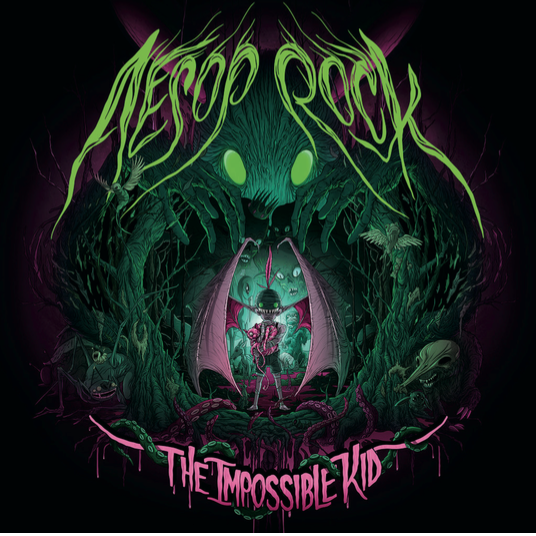By Pankaj Sharma (Contributor) – Email

When I began writing this review, I spent a lot of time agonizing over whether I should treat it as an introduction to Aesop Rock as an artist or really go in-depth into his progression from his earlier projects. Then I remembered that even though he might be a giant in the underground scene, associated with both the heyday of Definitive Jux (NY label founded by El-P from Run the Jewels) and the midwest Rhymesayers Camp, that most people outside the HipHopHeads subreddit don’t listen to underground rap. If by chance you, the reader, do listen to underground rap and have liked Aesop’s past work and side projects, then I have a good news. It’s classic Aes. You’re probably going to like this too.
For the uninitiated, Aesop Rock is a rapper and artist with a career that started in the late-1990s beginning with numerous solo projects, followed more recently by some collaborations, including one with anti-folk and Juno soundtrack legend Kimya Dawson. (Their album Hokey Fright, while somewhat of a mess, was incredibly fun and heartfelt.)
What has always set him apart has been both his voice (I’ve always likened it to the darkly comic toad monster who lives in the death swamps outside your village and will tag along during your quest) and his lyricism. Analysis conducted by Matt Daniels a few years ago, a data scientist and designer, ranked him as having a greater vocabulary than the likes of Eminem, GZA, and even Shakespeare. His wordplay is rich, at times esoteric. Many of his songs benefit from replay value as you dissect and extract new meanings and metaphors from his lyrics. Aesop himself highlights his tendency towards the abstract on the track “Shrunk,” in an exchange with his psychiatrist:
She said, “When you start getting all expressive and symbolic, it’s impossible to actualize an honest diagnostic.”
I said, “When you start getting all exact and algebraic, I’m reminded it’s a racket, not a rehabilitation,” okay
Agree to disagree as grown-ups from opposing clans
Honoring the push and pull, I should have called the Scholomance”
That being said, compared to his past discography, The Impossible Kid is probably the most accessible work he’s released. The writing and narratives are more straightforward and linear, such as his encounters on “Lotta Years” or the childhood stories from “Blood Sandwich.” The production as well is a far cry from the clamour and lo-fi sounds of Music for Earthworms or Float. His skills as a producer have continued to develop, and there is a variety and depth to the soundscape of this album.
The Impossible Kid hits on a lot of different notes and themes, the most prominent of which is his dark reflections on loss and suicide. In “Water Tower” he recounts a suicide attempt, and reflects:
“Hmm you’d think he would’ve learned back in the ‘80s
When they pulled him out of class over concerns about his safety”
But he didn’t, it wasn’t cause he doesn’t get the message
More he doesn’t judge a man by how honorable his death is
On “Get Out of the Car” he relates his titular moniker as a stubborn quest for happiness after the loss of his friend, Camu Tao, label mate from Definitive Jux who died from lung cancer in 2008.
Ah, Watch the Impossible Kid / Everything that he touch turns promptly to shit / If I zoom on out I can finally admit / It’s all been a blur since Mu got sick / None of the subsequent years stood a chance / Whether you his moms or his mans / Whether you his pops or his girl / I was poison, heart full of canines, head full of voices / Whole life trying to quiet ’em down / Like a suicide king with a knife in his crown
While this isn’t new ground for Aesop, whose work has always been preoccupied with the dark, weird, and dangerous, The Impossible Kid is him at his most honest. While he retains his drive for intricacy, the stories he tells are relatable whether he hides them behind metaphor and reference or not.

